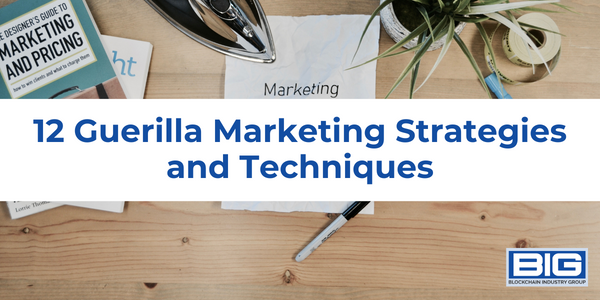
Guerilla marketing is a marketing strategy that uses unconventional, low-cost tactics to promote a product or service in unexpected ways. Guerilla marketing can be an effective way for small businesses and entrepreneurs to stand out from the competition and get noticed by their target audience. Here are 12 guerilla marketing strategies and techniques, illustrated with examples:
- Ambient marketing: Ambient marketing involves using the environment around you to promote your product or service. For example, a coffee shop could place a chalkboard sign in a busy pedestrian area, inviting people to come in for a free coffee sample.
- Street art: Street art, such as graffiti or mural painting, can be used as a form of guerilla marketing to promote a product or service in a creative and eye-catching way. For example, a clothing brand could commission a mural featuring their logo and tagline in a trendy neighborhood.
- Pop-up shops: Pop-up shops are temporary retail spaces that can be used as a form of guerilla marketing to generate buzz and attract new customers. For example, a craft beer company could set up a pop-up shop in a trendy neighborhood, offering tastings and merchandise.
- Stunt marketing: Stunt marketing involves creating a memorable and attention-grabbing event or action to promote a product or service. For example, a mobile phone company could hire a team of acrobats to perform tricks and hand out flyers at a busy intersection.
- Sampling: Sampling involves giving out free samples of a product or service to potential customers as a way to generate buzz and interest. For example, a bakery could set up a table in a busy shopping district, offering free samples of their freshly baked pastries.
- Street teams: Street teams are groups of people who are hired to promote a product or service in a public setting, such as on the street or at events. Street teams can be used to distribute flyers, coupons, or other promotional materials.
- Word-of-mouth marketing: Word-of-mouth marketing involves using satisfied customers to promote a product or service through their recommendations to friends and family. For example, a restaurant could offer a discount or free menu item to customers who refer a friend.
- Social media marketing: Social media marketing involves using social media platforms, such as Facebook and Instagram, to promote a product or service and engage with customers. For example, a small business could create a Facebook page and use it to post updates, offers, and content related to their products or services.
- Influencer marketing: Influencer marketing involves partnering with influential individuals or groups on social media to promote a product or service. For example, a fashion brand could collaborate with a popular fashion blogger to feature their products in a blog post or Instagram post.
- Affiliate marketing: Affiliate marketing involves partnering with other businesses or individuals to promote a product or service and earn a commission for each sale. For example, a small business could sign up for an affiliate program and use their website or social media accounts to promote products or services from other businesses, earning a commission for each sale made through their referral.
- Event sponsorship: Event sponsorship involves partnering with an event, such as a music festival or sports tournament, to promote a product or service. For example, a car company could sponsor a music festival and use the event to showcase their latest models and offer test drives.
- Mobile marketing: Mobile marketing involves using mobile devices, such as smartphones and tablets, to promote a product or service. Mobile marketing can take many forms, such as SMS text message campaigns, mobile app advertisements, or mobile-optimized websites. For example, a fitness company could create a mobile app that offers workout routines and nutrition plans, and use it to promote their products and services.
Instagram Reels: Short-Form Video Content
—
Inbound Marketing Metrics: The Measure of Success
—
Laws Regulating Email Marketing: CAN-SPAM and GDPR
Overall, guerilla marketing is a creative and cost-effective way for small businesses and entrepreneurs to get noticed and reach their target audience. By experimenting with different strategies and techniques, you can find what works best for your business and achieve your marketing goals.



